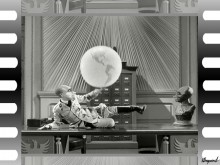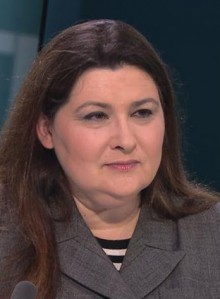The other day the Verkhovna Rada held a two-day-long conference, initiated by Hanna Hopko, the head of the parliamentary Foreign Affairs Committee. The conference was dedicated to the study of Russia’s hybrid warfare. “Hybrid war” is a term extensively used since the start of Russia’s aggression against Ukraine. Nevertheless, for many it remains rather general. Each interprets it in their own way. Indeed, unlike the concept and definitions of conventional war, “hybrid war” has no legal substantiation. Consequently, in case of such war it is difficult to identify its outset or the related repercussions.
The meetings at the parliament were organized by the Open Department on Foreign Policy, Security, and Diplomacy: an educational project which responds to the urgent need for a reasonable and well-grounded standpoint on external security and policy among Ukraine’s political elites. The key speakers at the first session were Cecile Vaissie, professor of Russian and Soviet studies at Rennes 2 University, and Yevhen Mahda, director of the Public Relations Center. In the focus of discussion were their books, which provide quite a substantial description of major factors of a “hybrid war” experienced now by Ukraine and Europe in general.
The Kremlin’s Network in France: the title of Vaissie’s book speaks volumes. Dr. Vaissie began with remembering her amazement when she discovered a number of internet blogs held by seemingly French nationals, who shared their exclusively positive impressions after visiting Russia. Moreover, they praised the auspicious business climate and the progress, unfolding before foreigners’ eyes in the most cheerful perspective. Such zealousness and allegiance, expressed by (allegedly) French nationals, led Dr. Vaissie to assume that some special service agents are being busy with a propaganda campaign, which they wage via concrete French nationals.
The participation of a French expert in the discussion is of particular importance, given that at a certain moment in time, Paris and New York City found themselves in the focus of Russian external factor. Even before Viktor Yanukovych came to power in Ukraine (the event which became the culmination of Kyiv’s definitive submission to Moscow), the Kremlin had started an absolutely open, formal deployment of its agents of influence in the West. In other words, Ukraine was but a stage in a new wave of Russia’s expansion. Former assistant to the president of the RF Sergey Yastrzhembsky claimed back then that as Russia booked success in solving its domestic problems, time was ripe to settle its external issues. In fact, by successful solution of domestic problems he meant strangled Chechnya and favorable economic conjuncture, namely oil prices. The latter, given the sad experience of the Soviet Union which failed after it had staked everything on oil, ought to have had a sobering effect on the Russian leadership. However, the obvious weakness of the international community became the backdrop against which Vladimir Putin was able to find enough room for play. In other words, the Kremlin felt impunity.
One of the Kremlin’s tentacles in Europe and the US was the so-called Institute for Democracy and Cooperation. Truth be told, in New York City this institution rolled back its activities, while in Paris it found quite a lot of opportunities.
“We can see to what extent the European Union’s unity has recently been undermined by the Kremlin’s influence,” said Hopko at the event. Indeed, despite the figures provided by Dr. Vaissie, which show that 85 percent of French people mistrust Putin and would rather see him the president of the Russian Federation than France, the nation in general is not sensitive to the threats posed by the Kremlin. And this is true not only of France. Disguise is the main trump card of a “hybrid war.”
“This theme is indeed being debated in France and Germany,” says Dr. Vaissie, “but I am not sure that the information which we are trying to get across would have proper results. It is very disconcerting. I took up the problems of Russian influence before the war in Crimea and Donbas. Prior to that I looked into Soviet propaganda, worked with dissidents, and studied the relations between culture and politics in the Soviet Union. Thanks to this, many things did not strike me as new. Now I see the Kremlin apply the methods used by the USSR, both in Russia and (even) in France.”
In this war, the Kremlin stakes not only on nuclear and other weapons. It develops methods of euthanizing statehood and sovereignty. These efforts were launched not yesterday. In her book, Dr. Vaissie suggests a detailed analysis of the Kremlin’s methods. Russia’s encroachment upon sovereignty became absolutely obvious to her, when Russia officially adopted the use of the term “fellow Russians.” Who are those “fellow Russians”? They are individuals who “even for a short while held the Russian and/or Soviet passport,” as well as “French nationals, descendants of immigrants from Russia.” What is the Kremlin’s interest here? Formally, to shape a sympathetic community. But actually it gives a pretext for interfering with other nations: as a rule, the term “fellow compatriots” is followed by the word “protection.” Ukraine has first-hand experience of Russia’s “protection” of “fellow Russians,” “brothers,” and “Slavs” in Donbas. Anything can trigger such an interference, from alleged “oppression of Russian-speaking population” to publicly urging Putin to bring his troops in.
It is common knowledge that a lot of descendants of former emigrants from the Russian Empire are now living in France, and the vast majority of them perfectly fit in the definition of the abovementioned term “fellow countrymen.” Yet how does it correlate with the holding of a French passport? Of course, such details escape an average French person. However, this does not disprove the fact that, according to opinion polls, France’s next president can be pro-Russian. France’s president! So what could be expected of Easter European nations, where we now see “Putin’s friends” grab power? Dr. Vaissie calls such policy “aggressive seduction.” This policy is anything but new. Renowned writers, journalists, global opinion leaders visited at some point the Soviet Union in the time of the Holodomor and repressions, and failed to see the obvious tragedy. Moreover, they praised Stalin and his policy to the skies.
Dr. Vaissie recalled the well-known Kravchenko case of 1949, when a French newspaper accused the Ukrainian Viktor Kravchenko of spreading lies, while he was trying to tell the world about the horrors of the Holodomor and repressions. This episode is old but indicative, and its conclusions are topical even today. Even despite the hopeful conclusions of Yevhen Mahda (Ukraine proved in 2014 that it can resist the Russian occupation machine), one question remains open: for how long yet will we have enough of our constructive and passionate spirit? France, just like the rest of Europe, believes that Russia is somewhere farther away while Ukraine, which is in the very epicenter of Russia’s imperial radiation, is forced to cling to its national roots (in an attempt to counter Muscovy’s inclination to steal the history of Kyivan Rus’) and, on the other hand, to develop its own state.
Presenting his own book, Mahda substantiated the worries of the French expert, but emphasized positive elements. However, in his speech he not a single time mentioned our state’s key inner problem (and who other than a Ukrainian expert should have done it?): the interests and behavior of oligarchic clans. It is their weak links which are the target for the aggressor and occupier.
Dr. Vaissie drew the following conclusions for Ukraine:
♦ Ukraine needs to think of its image for the outer world, and the global media want to see not only the pickets and flares in the center of Kyiv, but also pictures of the Verkhovna Rada session hall. Of course, one can see brawls not only in the Rada, but even in the Japanese parliament. However, in times of war Ukrainian MPs often show the world that they are absolutely aloof from the reality in which their own country lives.
♦ The West will indeed see real war on corruption in Ukraine, and not some sham measures. It is not so much a matter of setting up of various authorized institutes as a matter of trust on the part of foreign investors, who are not fooled by a formal imitation. The West wants to see Ukraine as a predictable partner, which would create foundations for a predictable cooperation, including that in the sphere of defense.
♦ Besides, Dr. Vaissie is convinced that Ukraine needs to seriously think about presenting itself on the level of creative opinion leaders, i.e. it must promote its own contemporary culture among Europeans and win popularity, thus opening the way to their hearts and minds.
In reality, given that the nation’s leadership never cared to appoint Ukraine’s official representative at NATO, for instance, and judging by the appointments of ambassadors to a number of strategic partner countries, one can conclude that Ukraine’s leaders indeed have no deep and clear-cut strategy of countering Russia’s extensive manipulations.
Dr. Vaissie’s book, which is at the moment partly translated into Ukrainian, is one of fundamental handbooks for a thorough research of Russia’s influence on the Western front. Given the peculiarities of Ukraine’s dialogs in the Normandy format, the changes of priorities in Europe’s (and even America’s) foreign policy, Russia’s systemic efforts in global “recruiting” must alarm both the leaders in Kyiv and those Ukrainian forces who call themselves passionate revolutionaries and often found themselves involved in provocations.









